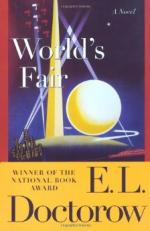|
This section contains 153 words (approx. 1 page at 300 words per page) |

|
Memories of childhood are so prevalent in literature that countless books might be cited as likely precedents for World's Fair. Perhaps the best example is Wordsworth's The Prelude (1850), where the growth of the poet's mind is chronicled through the fears and aspirations of a young boy. Doctorow is well aware of his debt to Wordsworth, and acknowledges it by using a few lines from The Prelude as an epigraph for World's Fair.
The most famous American novel with a child narrator is Twain's The Adventures of Huckleberry Finn (1885; see separate entry). It may be a long way from a raft on the Mississippi to an apartment in the Bronx; it is hard to imagine Huck with nice Jewish parents; but the art of storytelling with a child's point of view is coherent from Twain to Doctorow, and Huck would enjoy the exhibits and side shows at...
|
This section contains 153 words (approx. 1 page at 300 words per page) |

|




